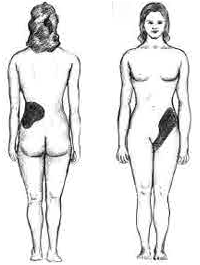
Kidney stones can develop anywhere in the urinary tract . Can be eliminated with urine or can block the urinary tract causing haematuria, renal colic , hydronephrosis .
The microscopic size of up to several centimeters , kidney stones are formed when mineral salts , mainly calcium oxalate or calcium phosphate , are gathered around the nucleus of bacteria, thrombus or other particles . Another substance that can cause the formation of uric acid calculi is .
Kidney stones occur due to many causes including hypercalcemia (which may occur due to hyperparathyroidism ) , excessive diet rich in calcium , abnormally prolonged immobilization of urinary pH , dehydration, hyperuricemia associated with gout , certain hereditary diseases .
The most common causes of renal stone formation is urinary stasis in the urinary concentration due to dehydration , benign prostatic adenomas , neurological disease , urethral strictures .
Calculus detection in urine requires careful monitoring of the patient will urinate in a container covered with gauze for potential calculi remain on it. This test will be continued until the patient removes calculus or before surgery , as appropriate .
Materials needed:
- sterile compresses
- graduated beaker
- urinary or bedpan
- Laboratory analysis request form
- container to collect stones that are eliminated
- labels
- written instructions which the patient recalls what to do
patient explains exactly the procedure to ensure the cooperation.
container labels are posted
patient is required to notify each micturition
compress is placed over the mouth of the container and can be fixed around for more safety .
put gloves . If the patient is bedridden and pissing in urinary or bedpan , urine will filter all graduated compression collection container attached . If you have urinary probe will filter the content header compression bag .
will examine compress after filtering urine . If they detect computer will be sent to the laboratory in a container along with the application form analysis after it was announced and doctor.
if Compressor will not stay calculi but tails and they will be sent to the laboratory for analysis.
if compress will remain intact , without waste or stones will be removed and a new one for the next micţionare
Special considerations :
if the patient is at home should learn how to filter and monitor urine and understand the importance of performing these maneuvers correctly.
calculi may appear in different colors. If this happens , each of them has diagnostic importance by size , color , etc. .
will withhold and send to the lab any suspicious residue will remain on the compressor because even the smallest stones can cause hematuria and pain.
No comments:
Post a Comment